
As Nigeria adjusts to the reality of a new National Anthem, two words, among a few others, have generated some controversy. These are ‘fatherland’ and ‘motherland’. In the anthem dropped (Arise o compatriots…), ‘fatherland’ prominently features, while ‘motherland’ returns with the new. Well, not too new because it is the country’s earlier anthem that has been brought back. We will not go into other aspects of the debates, especially the political, but we shall establish the connection between the two nouns, ‘fatherland’ and ‘motherland’.
In the old anthem, we have:
To serve our fatherland
With love and strength and faith
In the current:
Nigerians all, are proud to serve
Our sovereign Motherland.
Neither father, nor mother
A big mistake everyone should avoid is looking at the two words literally, especially with emphasis on ‘father’ and ‘mother’. The fact is that there is no difference in their meanings. Unlike what we have in ‘Father’s Day’ and ‘Mother’s Day’, where one is for men and the other for women, not only can both be described as genderless, but they also simply refer to countries especially when adored by their nationals.
The Encyclopedia Britannica, for instance, defines motherland as the country where you were born or where your family came from while fatherland is the country where you were born or where your family came from. Oxford Dictionary defines them (respectively) as ‘the country you were born in and that you feel a strong emotional connection with’ and ‘the country where a person, or their family, was born, especially when they feel very proud of it.’ Also according to Collins Dictionary, the motherland is the country in which you or your ancestors were born and to which you still feel emotionally linked, even if you live somewhere else. It says about the fatherland: ‘If someone is very proud of the country where they or their ancestors were born, they sometimes refer to it as the fatherland.’ It is, therefore, clear that all the dictionaries agree on the sameness of the meanings of the terms.
National choices
The above definitions indicate that unlike what you have in father-in-law and mother-in-law, the question of masculine/feminine consideration hardly comes in. Experts note that whether a country is referred to as the fatherland or motherland, the choice belongs to it. Some countries are, however, differently traditionally/fondly linked to the words. For instance, while Germany is known to be ‘the motherland’ , Russia is ‘the fatherland’. But in the case of Nigeria, that the ‘new’ anthem says it is a motherland does not mean the country is still not a fatherland. Put differently, although mother is always supreme, the reference to Nigeria as the motherland should not be taken as a symbol of gender preference or superiority.
Mother’s land?
Meanwhile, we must note the proper way of saying or writing the terms. Both are compound words, the type that brings together the two or more words joined without the use of a hyphen. It is in the class of crossroads, schoolchildren and headmaster. Because the expression is not showing possession, it also eliminates the apostrophe. So, it is the motherland, not mother’s land as ‘motherland’ does not mean a land or country that belongs to mothers. Otherwise, even daughters would be left out of the ownership! If you are talking about a parcel of land that belongs to your mother, you can say ‘mother’s land’. But because we mean a whole country that belongs to everyone, the correct expression is the motherland. The same, of course, applies to the fatherland.
Article ‘the’
Another grammatical feature that defines ‘fatherland’ and ‘motherland’ is that they are normally preceded by the definite article ‘the’. Such appears to underscore the importance and collectiveness of its essence. Consider these:
Everyone is working towards the progress of the motherland.
As Nigerians, concern for the fatherland should be uppermost in our hearts.
A proper noun?
Both words are, ordinarily, common nouns, not proper nouns. Common nouns refer to names of general or non-specific objects, like chair, bottle, weather, town, country and television, while proper nouns are names of specific persons, countries, villages, states, months, religions etc. Common nouns normally begin with small letters (unless they start sentences) while proper ones are capitalised. So, when ‘country’ is a common noun, Nigeria, Ghana, France are proper nouns:
Nigeria is a big country.
France and Canada are two of world’s most powerful nations.
I did it for the sake of the fatherland.
Put the interest of the motherland at heart.
The question can then be asked: why does ‘motherland’ begin with a capital letter in the official version of the new National Anthem the Federal Government releaesed through the NOA? Once it is a deliberate act, and is going to be uniformly maintained, it could be said to be a specialised usage, a way of personifying the country, showing her more love and respect, as also symbolised by my use of ‘her’ here.
Tribes and tongues
The National Orientation Agency has also corrected a mistake some people have been making in the way they write the new anthem. This has to do with number. While such people wrote:
Though tribe and tongue may differ
In brotherhood, we stand
the corrected verse reads:
Though tribes and tongues may differ
In brotherhood, we stand
This is self-explanatory because Nigeria is a country of many ethnic nationalities and languages. So, ours are tribes and tongues, not tribe and tongue.





